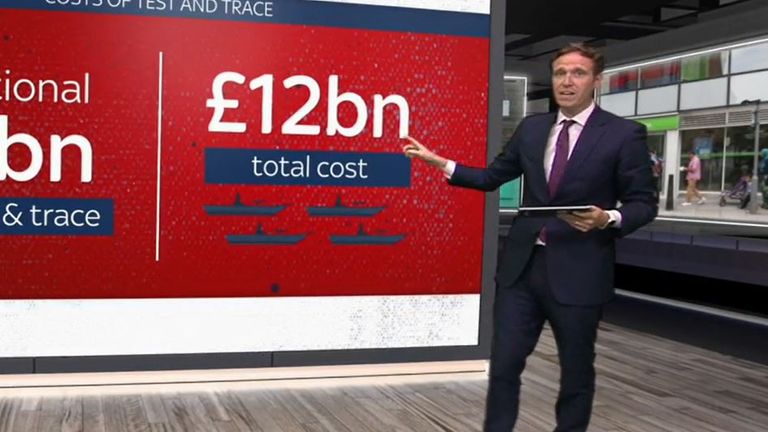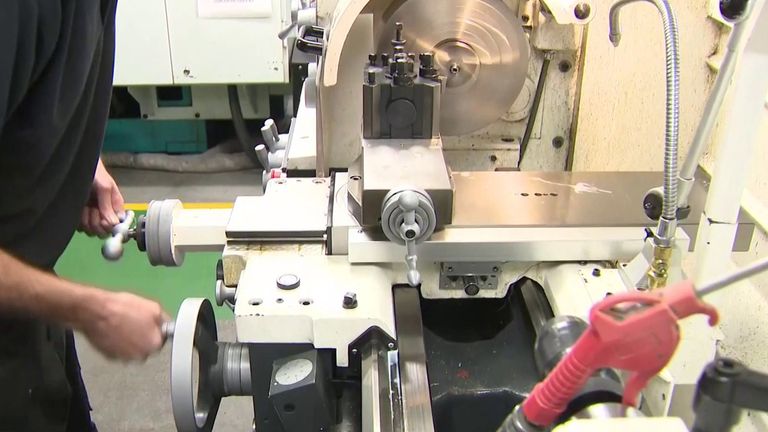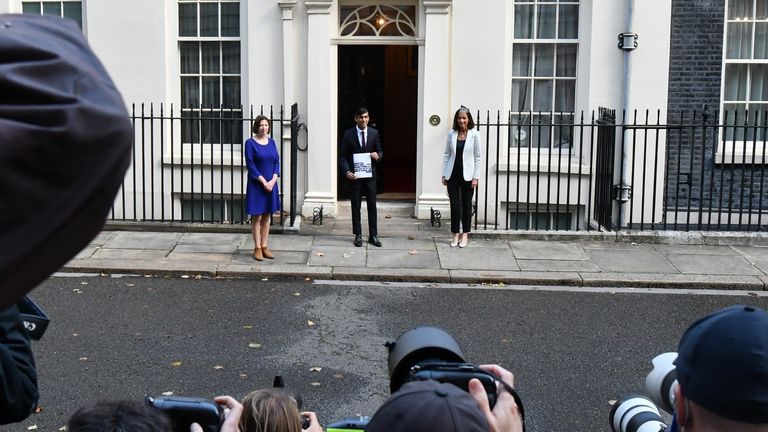Rishi Sunak could not have been more stark.
Unveiling his latest package aimed at tiding the UK economy through what threatens to be the bleakest winter for many years because of the COVID-19 crisis, the chancellor admitted: “I cannot save every business. I cannot save every job.”
That much became clear as the City’s economists picked through the details.
Mr Sunak declined to put a figure on the cost of his measures, but the market consensus is that they will come to around £5bn, which may sound like a lot but, in the context of a £2trn economy, is a rounding error.
Drill further into the numbers and it is quite clear that the chancellor’s new jobs support scheme is less generous than the Kurzarbeit scheme in Germany on which it is based.
Both with Kurzarbeit and a similar scheme in France, the state alone covers the costs of hours not worked by an employee, whereas the burden here falls chiefly on the employer.
Under the most recent iteration of the furlough scheme, the employer only pays around 20% of the cost of employing a worker whose hours have been restricted or curtailed entirely by the lockdown, whereas this will rise to 55% under the new job support scheme.
It is hard to see why an employer, struggling to stay in business and uncertain about the future, might be prepared to pay this additional cost rather than taking the easier option of laying off workers.
As Sanjay Raja, economist at Deutsche Bank, put it: “The chancellor’s jobs support programme falls short of other European schemes extended to project jobs through a second wave of the pandemic.
“The chancellor’s job support scheme is both shorter in duration and is limited solely to part-time workers. In effect, those companies who can somewhat manage to keep trading over the winter months will get some government support, while others who can’t will either be required to pause trading or to continue with ongoing redundancy plans.”
Asked by reporters by how much unemployment might rise during coming months, Mr Sunak declined to give a figure, instead pointing them towards recent forecasts made by the Bank of England and the independent Office for Budget Responsibility.
The Bank is predicting a rise in the jobless rate to 7.5% by the end of the year, up from the current 4.1%, but that was a prediction made before the government’s latest curtailments on social movement announced earlier this week.
The OBR sees the jobless rate being closer to 9% – translating to a total of around 3.1 million unemployed.
So which are the workers who are most at risk of losing their jobs in coming months?
This may, at first, seem obvious from a look at the industries making most use of the existing furlough scheme: the arts, entertainment, nightclub, leisure, events and wider hospitality sectors.
But it is not as straightforward as that.
Allan Monks, from the economic and policy research team at JP Morgan, points out that employees currently working less than a third of their usual hours are probably most at risk.
That is because, under the new job support scheme, their wages are not covered until they are working a third of their usual hours. So, for businesses employing such people, there would be a big cost saving to be made by letting them go.
Similarly, for those who are working a third of their hours or around that level, their employer also faces a big increase in costs when the new scheme replaces the existing furlough scheme.
Mr Monks adds: “The more hours workers are currently doing, the smaller the rise in business costs associated with keeping them on under the new scheme. That’s because at higher levels of hours worked, the subsidy that firms must pay for unworked hours shrinks.”
Accordingly, he notes, it is difficult to estimate how many jobs will be lost under the new scheme without knowing how many hours furloughed employees are currently working.
Nor is that the only kink in the system. The new programme appears to create incentives for companies to keep people in full-time work while letting go those who are only employed on a part-time basis.
One quirk, identified by Mr Monks, is that it would be more effective for a company to have one person on full pay rather than three on one-third of full pay.
Another, identified by the Resolution Foundation think tank, is that it would cost a business £1,500 to employ one full-time worker on £17,000 per year but more than £2,000 per month to employ two half-time workers on the same full-time equivalent salary.
So the workers most likely to be at risk once the furlough scheme ends and the new job support scheme comes in would appear to be those already working around a third of their normal hours and especially those in the leisure, hospitality, arts and entertainment sectors – pubs, bars, restaurants, hotels and cinemas.
The quirks in the system also mean that those employees currently perhaps working on a part-time basis, if they are valued by their employer, are likely to be asked to do more hours at the expense of less-valued colleagues being let go.
The chancellor did at least achieve one notable coup on Thursday when Dame Carolyn Fairbairn, director-general of the CBI and Frances O’Grady, general secretary of the TUC, stood alongside him on the steps of 11 Downing Street as he unveiled the new package.
Not even in the ‘beer and sandwiches’ era of the 1970s, when all-powerful union barons would be invited to No 10 for meetings with Labour prime ministers like Harold Wilson and Jim Callaghan, has a TUC general secretary received such an accolade – and certainly not from a Conservative chancellor. Nor has the CBI always been supportive of government policy.
On Friday, Dame Carolyn fended off criticism of Mr Sunak’s package, pointing out that the existing furlough scheme – like the new job support scheme – also contained an employer contribution.
She told Sky News: “It’s a tough message but I think it’s the right message – we want jobs that have a future to be protected.
“What employers will be asking themselves is do they think these jobs will come back and, if they do, they will make that investment.
“Many are doing that – they want to keep their skilled people, they want to do the right things by their staff, and we think many employers will take advantage of this because they do see demand coming back over the longer run.
“For employers who don’t see demand coming back, this will not be the right scheme – they will be looking at the loan schemes, at the other relief that there is in place, but for many employers, particularly those with skilled people in manufacturing supply chains, this will be a real lifeline.”
In fairness to the chancellor, he is not disguising the fact that not every job will be saved, even hinting at times that he thinks his cabinet colleagues have unnecessarily endangered jobs by placing fresh impositions on social movement.
Perhaps the greater criticism that can be laid at his door is that he said rather less, yesterday, on helping find new jobs for the thousands of Britons who are set to lose theirs.
Dame Carolyn argued that employees put on part-time hours could be usefully retrained and reskilled during the hours in which they were not working.
Few familiar with the UK’s woeful record on productivity will disagree with that.





